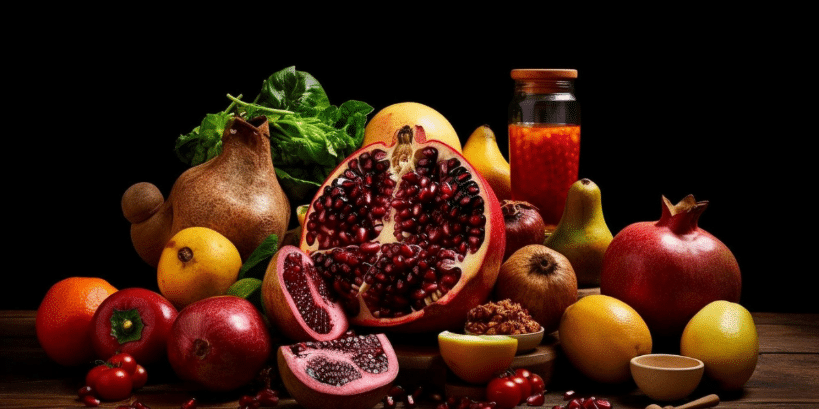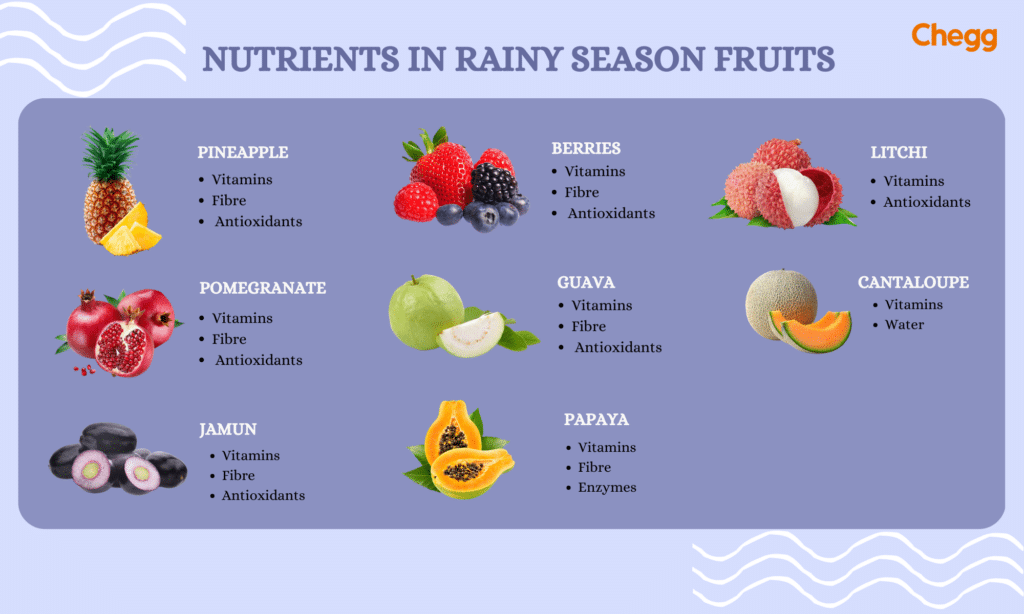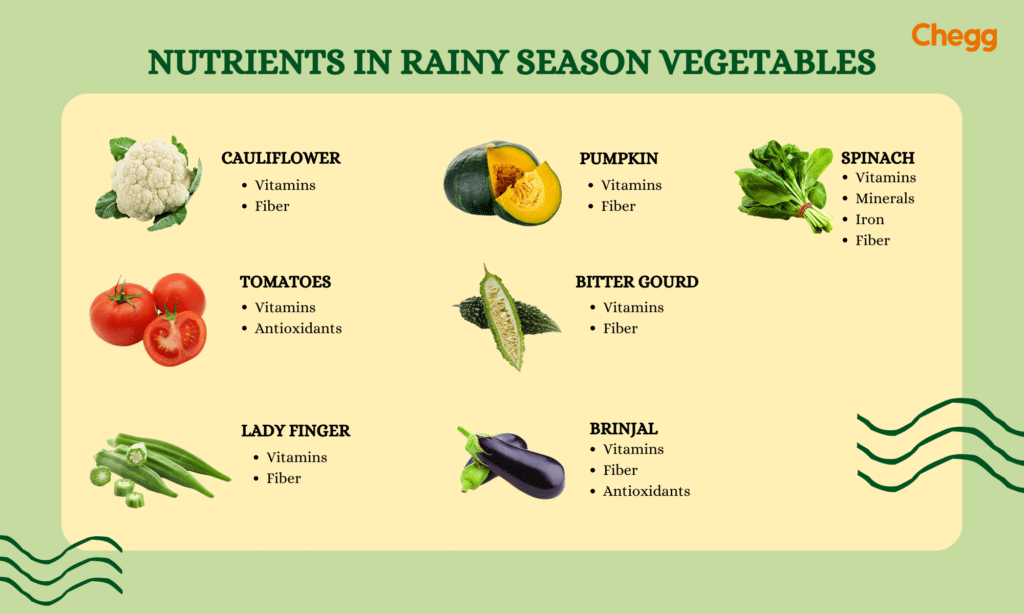
Quick Summary
Table of Contents
India’s rainy season, also called the monsoon season (June to September), brings a fresh bounty of seasonal fruits that are both delicious and immunity-boosting. Some of the best fruits to enjoy during the monsoon include litchi, jamun (black plum), plums, pears, and cherries. These fruits offer a refreshing taste and are rich in antioxidants, vitamins, and hydrating properties, making them ideal for maintaining health during the humid and fluctuating weather.
In India, the rainy season is more than just a weather change, a vibrant celebration of nature’s revival. As the scorching summer heat fades, the land awakens with lush greenery and shimmering raindrops, transforming the landscape into a refreshing paradise. The monsoon replenishes water sources and breathes new life into agriculture. With it comes an array of rainy season fruits in India, turning this time into a mouthwatering culinary delight for people across the country. Ready to taste nature’s monsoon magic?
Rainy season fruits in India are tasty, healthy, and grow during the monsoon season. When rain showers nourish the soil and supply the necessary moisture for their growth, these Rainy season fruits ripen and become available. They are renowned for their refreshing taste, high water content, and distinctive flavors. It aids in combating humid and wet conditions. Rainy season fruits aren’t only delicious and rich in nutrients, minerals, and antioxidants. They assist with general health throughout these 12 months.
Rainy Season Fruits in India are essential for their seasonality and multiple benefits. These rainy season fruits are high in critical vitamins, minerals, and antioxidants. They assist in building immunity and combat infections common during the monsoon season. In humid temperatures, the high water content keeps people hydrated. Furthermore, they bring diversity to the diet and help to maintain a balanced and nutritious consumption. These rainy season fruits also benefit local agriculture by offering a source of income for many farmers.
Eating rainy season fruits is highly beneficial for several reasons. Here’s why you should include seasonal fruits in your diet during this time:
1. Boosts Immunity
The rainy season often brings a rise in illnesses like colds, coughs, and flu. Rainy season fruits rich in vitamin C, like citrus fruits (oranges, lemons) and guavas, help strengthen the immune system, protecting you from infections and boosting overall health.
2. Detoxifies the Body
Rainy season fruits, such as watermelon, are hydrating and help flush out toxins from the body. Their high water content aids in detoxifying the system, ensuring your body stays refreshed and energized.
3. Provides Essential Nutrients
Rainy season fruits like mangoes, jamuns, and lychees are packed with essential vitamins, antioxidants, and minerals, which are vital during the rainy season. These nutrients support your skin, digestion, and overall wellness.
4. Improves Digestion
Fruits like papayas, pineapples, and bananas, which are in season during the rainy months, aid digestion. They contain enzymes that improve gut health and help prevent common digestive issues that can arise during the rainy season.
5. Hydrates the Body
The humidity and rain can cause dehydration due to sweat and the fluctuating weather. Rainy season fruits like cucumbers, watermelons, and cantaloupes, which are high in water content, help keep your body hydrated and replenish lost fluids.
6. Balances Body Temperature
Fruits from the rainy season help regulate the body temperature, as they naturally cool. For instance, watermelon and cucumbers keep the body cool and prevent overheating due to humidity.
7. Supports Skin Health
The rainy season can bring about skin issues like acne, rashes, and dryness due to weather changes. Eating rainy season fruits rich in antioxidants and vitamins, such as berries, citrus fruits, and papayas, can help improve skin health and give you a natural glow.
8. Reduces the Risk of Water-Borne Diseases
During the rainy season, water contamination increases, which can lead to waterborne diseases. Eating fresh, clean, seasonal fruits can provide a natural defense against such diseases, as many fruits have antibacterial and antiviral properties.
9. Easily Available and Affordable
During the rainy season, many fruits like bananas, guavas, and jamuns are abundant, making them affordable and easily accessible. This is an excellent opportunity to enjoy these nutritious fruits without spending much.
10. Helps in Weight Management
Many rainy season fruits, such as pomegranates, papayas, and melons, are low in calories but high in fiber. Including them in your diet helps weight management by keeping you full longer and reducing unnecessary cravings.
11. Improves Mental Health
The monsoon weather can sometimes cause mood swings or seasonal affective disorder (SAD). Eating rainy season fruits like bananas, which are high in magnesium, can help regulate mood and improve mental well-being during the rainy season.
12. Promotes Overall Wellness
Including various fruits during the rainy season helps maintain a balanced, nutritious diet. Their diverse flavors and textures make meals more enjoyable and promote general health and well-being.
Incorporating these nutrient-rich and hydrating fruits into your diet during the rainy season can keep you healthy and energized and help you make the most of the season.
During India’s monsoon season, many delectable fruits and vegetables thrive, adorning the gastronomic landscape. Rainy season fruits in India, like mangoes, lychees, and Jamuns, provide a sweet and tangy reprieve throughout the rainy season. Simultaneously, vegetables such as spinach, bitter gourd, and okra add a variety of textures and flavors to traditional recipes. These rainy season fruits in India are a treat for the taste buds and a powerhouse of nutrition. They are high in vitamins, minerals, and antioxidants, which help increase immunity and overall health. These rain-kissed delicacies are a monument to the natural wealth and lively diversity that the Indian subcontinent experiences during the monsoon season.
These popular wet-season fruits have extensive flavors and several health benefits, including better immunity, digestion, pores, and skin health. They are high in critical vitamins, minerals, antioxidants, and nutritional fiber, making them a superb addition to a well-balanced and healthful food plan throughout the monsoon season. This table includes rainy season fruits in India or seasonal fruits in India in August, including their name, description, area, and soil needs, health advantages, and nutritional content:

| Fruit | Color & Taste | Area & Soil Requirement | Health Benefits | Key Nutrients |
|---|---|---|---|---|
| Pineapple | Yellow; Sweet and tangy, tropical | Grows in various regions; well-drained, loamy soil | Subtropical regions, deep, well-drained soil | Vitamins, Fiber, Antioxidants |
| Litchi | White (translucent); Sweet and slightly floral | Grows in various regions; well-drained, loamy soil | Rich in vitamin C, hydrates, boosts immunity, fights infections, rejuvenates skin | Vitamins, Antioxidants |
| Jamun | Dark purple-black; Sweet and tangy | Rich in antioxidants, promotes heart health, enhances memory, hydrates, and improves skin | Manages diabetes, aids digestion, improves skin and heart health | Vitamins, Fiber, Antioxidants |
| Guava | Green to pink; Sweet with a unique flavor | Grows in various regions; well-drained, loamy soil | High in vitamin C, boosts immunity, supports digestion and weight management, improves skin | Vitamins, Fiber, Antioxidants |
| Berries | Blue, red, purple; Sweet and tart | Grows in diverse climates; fertile, well-drained soil | Rich in antioxidants, supports heart and brain health, aids digestion, improves skin, boosts immunity | Vitamins, Fiber, Antioxidants |
| Papaya | High in vitamin C, aids digestion, boosts immunity, promotes healthy skin, and provides energy | Grows in diverse climates; well-drained, fertile soil | High in vitamins and enzymes, improves digestion, supports skin health, boosts immunity | Vitamins, Fiber, Enzymes |
| Pomegranate | Ruby-red; Sweet and tangy | Grows in varied climates; well-drained, loamy soil | Orange, Sweet, and refreshing | Vitamins, Fiber, Antioxidants |
| Cantaloupe | Orange, Sweet and slightly musky | Grows in various regions; well-drained, sandy soil | Orange, Sweet and refreshing | Vitamins, Water |
These rainy season vegetables are essential in Indian cuisine and provide a variety of flavors and health advantages. They aren’t the most straightforward, tasty additions to food, but they contain critical factors that help a nicely balanced and nutritious weight loss program. During the monsoon season, devour those vegetables to live wholesomely and enjoy the flavors in your meal. This table includes rainy season vegetables in India, including their name, description, area, soil needs, health advantages, and nutritional content:

| Vegetable | Color & Taste | Area & Soil Requirement | Health Benefits | Key Nutrients |
|---|---|---|---|---|
| Spinach | Dark green; Mild and slightly earthy | Tropical regions; well-drained, loamy soil | High in iron and vitamins, boosts immunity, supports bone health, digestion, and weight management | Vitamins, Minerals, Iron, Fiber |
| Bitter Gourd | Green; Bitter | Grows in various climates; well-drained, loamy soil | Manages blood sugar, aids digestion, promotes weight loss, supports liver and immune health | Vitamins, Fiber |
| Lady’s Finger | Green; Mild and slightly slimy | Grows in various regions; well-drained, loamy soil | High in fiber, supports digestion, heart health, eye health, weight management, and immunity | Vitamins, Fiber |
| Cauliflower | White; Mild and slightly nutty | Grows in various regions; well-drained, fertile soil | Rich in vitamin C, supports digestion, bone health, weight loss, and healthy skin | Vitamins, Fiber |
| Brinjal (Eggplant) | Purple; Slightly bitter | Grows in various regions; well-drained, fertile soil | Low in calories, promotes heart and brain health, aids digestion, rich in antioxidants | Vitamins, Fiber, Antioxidants |
| Tomatoes | Green and red; Tangy and slightly sweet | Suitable for varied climates; well-drained, fertile soil | Rich in vitamin C and antioxidants, supports heart health, skin, eyes, and digestion | Vitamins, Antioxidants |
| Pumpkin | Orange; Mild and slightly sweet | Grows in various regions; well-drained, fertile soil | High in beta-carotene, aids digestion, hydration, skin health, weight loss, and immunity | Vitamins, Fiber, Beta-carotene |

Enjoy these vibrant and nutritious rainy season fruits in India to boost your health, energy, and immunity during the monsoon!
Monsoon fruits in Maharashtra give a delicious and juicy experience as the rain-soaked earth breathes life into the orchards and fields, making it a culinary paradise for fruit experts. This table contains information about Maharashtra’s rainy season fruits, including their name, description, area and soil requirements, health advantages, and nutritional content:
| Fruit Name | Description | Area and Soil Requirement | Benefits for Health | Nutritional Content |
| Alphonso Mango | Yellow skin with a sweet, aromatic taste | Thrives in the Konkan region | It boosts immunity and supports eye health. It promotes digestion and enhances skin growth. | Vitamins |
| Minerals | ||||
| Antioxidants | ||||
| Fiber | ||||
| Jamun | Dark purple to black, and the taste is sweet and tangy. | Grows in various regions | It manages diabetes. It aids digestion and improves skin. It is rich in antioxidants and supports heart health. | Vitamins |
| Antioxidants | ||||
| Fiber | ||||
| Guava | Green with a distinct aroma and sweet taste | Suitable for diverse climates | It is high in vitamin C and boosts immunity. It aids in digestion and promotes weight management. It supports skin health. | Vitamins |
| Antioxidants | ||||
| Fiber | ||||
| Pomelo | Large citrus fruit with a mild sweet taste | Thrives in warm climates | Rich in vitamin C aids digestion, supports eye health, promotes weight management, and enhances skin health. | Antioxidants |
| Vitamins | ||||
| Custard Apple | Green, scaly skin, sweet and creamy flesh | Suitable for subtropical regions | It supports digestion, provides energy, aids weight management, enhances skin health, and boosts immunity. | Fiber |
| Vitamins | ||||
| Kokum | Small purple fruit with a tangy taste | Grows in the Konkan region | It aids in digestion and promotes heart health. It supports weight management. It provides relief from acidity and enhances skin health. | Antioxidants |
| Vitamins | ||||
| Karvanda (Carissa) | Small red to black fruit with a tart flavor | Thrives in various regions | High in vitamin C. It aids digestion and supports weight management. It boosts immunity and improves skin health. | Vitamins |
| Antioxidants | ||||
| Fiber | ||||
| Sapota (Chikoo) | Brown skin with sweet, grainy flesh | Suitable for diverse climates | It provides energy. It aids in digestion. It supports bone health. It boosts immunity and enhances skin growth. | Vitamins |
| Minerals | ||||
| Fiber | ||||
| Starfruit | Yellow with a unique star-like shape | Thrives in warm climates | It manages diabetes, aids digestion, and improves skin. It is rich in antioxidants and supports heart health. | Vitamins |
| Fiber | ||||
| Indian Gooseberry (Amla) | Green, sour, and tangy | Suitable for diverse climates | High in vitamin C. It boosts immunity and aids in digestion. It supports heart health and enhances hair and skin growth. | Vitamins |
| Fiber | ||||
| Antioxidants | ||||
| Fig (Anjeer) | Green or purple skin with sweet, seedy flesh | Thrives in warm climates | It supports digestion, provides energy, aids weight management, enhances skin health, and supports heart health. | Fiber |
| Vitamins | ||||
| Jackfruit (Phanas) | Large fruit with sweet, fleshy pods | Suitable for tropical regions | Rich in vitamin C. Aids in digestion promote weight management. | Vitamins |
| Minerals | ||||
| Fiber | ||||
| Indian Jujube (Ber) | Small, round fruit with a sweet and tangy taste | Grows in various regions | Aids in digestion. Supports heart health. Boosts immunity and enhances skin health. Provides energy. | Vitamins |
| Antioxidants | ||||
| Fiber | ||||
| Tamarind (Imli) | Brown pods with a sour, tangy flavor | Suitable for diverse climates | It supports digestion, relieves acidity, enhances heart health, and aids weight management. | Vitamins |
| Minerals | ||||
| Fibers |
The monsoon season brings a delightful change in scenery, but it also requires some adjustments to your diet. Here’s a list of foods to be cautious about during this time:
Street Stall Staples:
Digestive Downers:
Seafood Savvy:
Fresh Produce Precautions:
In India, the rainy season is a cultural and culinary celebration and a climatic occurrence. The arrival of a vast assortment of rainy season fruits that are a treat to the tongue and a source of essential sustenance marks the seasonal shift from sweltering summers to soothing monsoons. These rainy season fruits in India symbolize nature’s richness, from the delicious mangoes, known as the “king of fruits,” to the sweet and tart Jamuns. They offer various fitness benefits, improved immunity, digestion, nutrients, and antioxidants.
These culminations are more than just a supply of nutrition; they link to our past. The monsoons breathe new life into the dry earth and lift our spirits. We celebrate the combination of nature and culture as we savor these luscious gems, making the rainy season in India a time of restoration for both body and soul. The rainy season fruits in India hold a special place in our hearts, offering a burst of flavor and a deep connection to the rhythms of the land.
Read More:
Guava Juice, the Super Fruit. Packed with nutrients, every 100g of guava contains 40g of magnesium and nearly four times the Vitamin C found in an orange.
Almonds are one of the best dry fruits to consume during the rainy season. They boost immunity, aid digestion, and are rich in vitamin E and antioxidants, which help fight infections. Other good options include walnuts for brain health and cashews for energy. Always store them in airtight containers to avoid moisture spoilage.
Seasonal fruits in India vary by climate and region. In summer, mangoes, lychees, and watermelons dominate. Monsoon brings jamun, plums, and cherries. Winter offers oranges, guavas, and apples. These fruits are rich in vitamins, antioxidants, and fiber, supporting health, hydration, and immunity throughout the changing seasons.
Some popular seasonal fruits in the monsoon are plums, cherries, lychees, jamun, and pomegranates. These are well suited for the rainy season due to their plump water content and abundant nutrient profiles, packed with minerals and antioxidants that boost your health while keeping you hydrated through the season.
Popular fruits include mangoes, lychees, guavas, and jamuns, which thrive during the monsoon months. These refreshing fruits are rich in vitamins and antioxidants, perfect for boosting immunity during the rainy season.
During the monsoon, opt for apples, pears, pomegranates, lychees, and bananas, as their low water content helps reduce the risk of waterborne diseases. However, consume mangoes cautiously, as they may cause skin issues like pimples.
During the monsoon, Maharashtra yields seasonal fruits like Alphonso mango, jamun, guava, custard apple, kokum, and chikoo. These fruits are rich in vitamins and antioxidants, helping boost immunity and aid digestion.
Seasonal fruits are produce harvested at their peak season, offering the best flavor and nutrition. In India, summer yields mangoes and watermelons; monsoon brings jamun and litchi; while winter provides oranges and apples. Availability varies by region.

Authored by, Muskan Gupta
Content Curator
Muskan believes learning should feel like an adventure, not a chore. With years of experience in content creation and strategy, she specializes in educational topics, online earning opportunities, and general knowledge. She enjoys sharing her insights through blogs and articles that inform and inspire her readers. When she’s not writing, you’ll likely find her hopping between bookstores and bakeries, always in search of her next favorite read or treat.
Editor's Recommendations
Chegg India does not ask for money to offer any opportunity with the company. We request you to be vigilant before sharing your personal and financial information with any third party. Beware of fraudulent activities claiming affiliation with our company and promising monetary rewards or benefits. Chegg India shall not be responsible for any losses resulting from such activities.
Chegg India does not ask for money to offer any opportunity with the company. We request you to be vigilant before sharing your personal and financial information with any third party. Beware of fraudulent activities claiming affiliation with our company and promising monetary rewards or benefits. Chegg India shall not be responsible for any losses resulting from such activities.